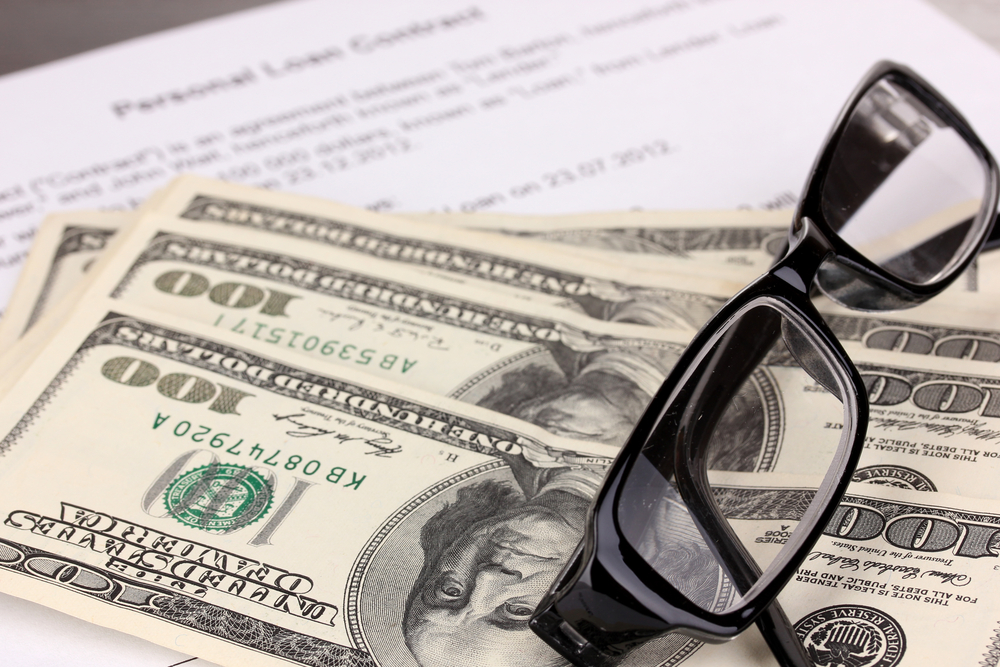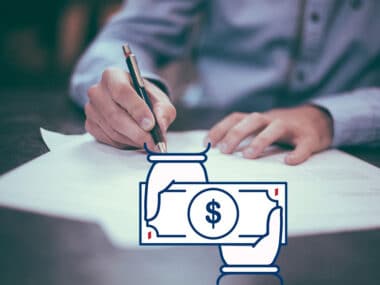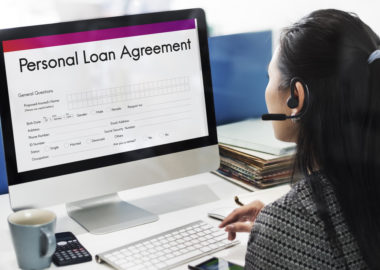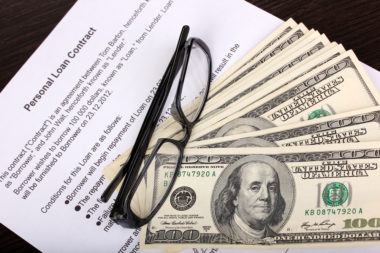Struggling to get a loan is one of the primary drawbacks of having bad credit. Most traditional lenders will consider you a risky borrower, which does limit your options if you want to take a loan out in your own name or without the help of a cosigner.
You probably won’t have much luck getting a loan from a large bank or local credit union — and if you do, it’ll probably come with a high interest rate, strict repayment schedule, or other unfavorable terms.
Though it poses more of a challenge, it’s still possible to get a personal loan even if you have bad credit. You just have to know how and where to shop for bad credit loans.
Table of Contents
Best Lenders for Bad Credit Loans
Regardless of your credit score, you have to find the right lender before taking out a personal loan. Because you have bad credit, you may encounter predatory lenders.
That means you’ll need to find a legitimate lender who doesn’t base all of their loan decisions on your credit score.
Many lenders are willing to give out bad credit loans as long as you have a valid checking account, stable employment, or regular monthly income. Consider a loan from one of the following lenders, all of which are open to borrowers with bad credit:
1. BadCreditLoans.com
BadCreditLoans.com is not a lender; rather, they are a lending network, connecting borrowers with reliable lenders. They understand that life can put you into difficult and unexpected situations, no matter what your credit score is.
You can request a loan online and get approved quickly; depending on the lender, you may get your funds the day after accepting the loan.
- Loan amount: $500 to $10,000;
- APR: 5.99% to 35.99%;
- Loan term: Three to 72 months;
- Application requirements: At least 18 years of age, U.S. citizen or permanent resident, regular monthly income, a checking account, work and home phone numbers, and a valid email address.
- Learn more about BadCreditLoans.com today.
2. Avant
Avant offers both secured and unsecured personal loans, so you can get the funds you need regardless of your current finances. Whether you want to consolidate debt or improve your home, you can use your loan for whatever you need.
From completing the application to receiving your funds to making monthly payments, the entire loan process is easy and convenient, as everything is done online.
- Loan amount: $2,000 to $35,000;
- Annual percentage rate (APR): 9.95% to 35.99%;
- Loan term: 24 to 60 months;
- Application requirements: Requirements may vary based on the loan amount, personal financial information, and location.
3. CashUSA.com
CashUSA.com is another lending network designed to help individuals with bad credit get the loans they need. They have both state and Tribal lenders who offer personal loans and, on occasion, lines of credit.
You can apply for a loan online and, upon approval, receive your loan as quickly as the next business day. They also offer customized financial education resources so you can make an informed decision before committing to a loan.
- Loan amount: $500 to $10,000;
- APR: 5.99% to 35.99%;
- Loan term: Three to 72 months;
- Application requirements: At least 18 years of age, U.S. citizen or permanent resident, $1,000 in after-tax monthly income, a checking account, and valid phone number and email address.
- Learn more about CashUSA today.
4. OneMain Financial
OneMain Financial looks beyond your credit score to create a customized loan that works for you. They consider a variety of factors, including your credit history, any collateral, and your current income and expenses to determine the terms of your loan.
Their online application process is fast, and if you get approved before noon, you may receive funds on the same day.
- Loan amount: $1,500 to $20,000;
- APR: 18.00% to 35.99%;
- Loan term: 24 to 60 months;
- Application requirements: Requirements may vary based on the loan amount, personal financial information, and location.
5. OppLoans
Unlike traditional lenders, OppLoans offers financing to borrowers with bad credit without requiring collateral. In addition to bad credit loans, they also provide installment loans and no-credit-check loans. They report to the three major credit bureaus so you can build positive credit while paying down your loan.
- Loan amount: $500 to $4,000;
- APR: 99% to 199%;
- Loan term: Up to 24 months;
- Application requirements: At least 18 years of age, residency in an eligible state, regular source of monthly income, a checking or savings account, and the ability to receive direct deposit payments.
- Learn more about OppLoans today.
6. Payoff
Payoff offers loans that are specifically designed to help you pay off credit card debt. Instead of juggling multiple credit cards, you can make one payment monthly to eliminate your debt.
Payoff guarantees fixed monthly payments and doesn’t charge late fees so you’re able to control your debt. Though they do run a hard credit check, their loans are designed to help boost your credit score and improve your finances as a whole.
- Loan amount: $5,000 to $40,000;
- APR: 5.99% to 24.99%;
- Loan term: 24 to 60 months;
- Application requirements: At least three years of established credit, FICO score of at least 640, no current delinquencies, and submission of financial documents as needed (such as pay stubs or proof of income).
7. PersonalLoans.com
As their name suggests, PersonalLoans.com is a lending network that connects borrowers who are seeking a personal loan with a lender they can trust. They provide peer-to-peer, personal installment, and bank loans. Depending on your needs, you can get a more traditional, long-term loan or a smaller loan with a short repayment period.
- Loan amount: $500 to $35,000;
- APR: 5.99% to 35.99%;
- Loan term: Three to 72 months;
- Application requirements: At least 18 years of age, U.S. citizen or permanent resident, regular monthly income, a valid checking account, a pattern of responsible credit usage (including no accounts in default and no active/recent bankruptcies).
- Learn more about PersonalLoans.com today.
8. Prosper
Prosper benefits lenders who want to make active investments and borrowers who need quick financial assistance. They offer fixed-rate, fixed-term personal loans, as well as debt consolidation loans, home improvement loans, healthcare financing, and home equity lines of credit (HELOC).
Prosper will manage the relationship between you and your lender — all you have to do is complete their online application.
- Loan amount: $2,000 to $40,000;
- APR: 7.95% to 35.99%;
- Loan term: 36 or 60 months;
- Application requirements: At least 18 years of age, U.S. citizen and eligible state residency, FICO score of at least 640, no more than five hard credit checks in the last six months, some amount of annual income, 50% debt-to-income ratio, at least three open trades on your credit report, and no bankruptcies within the last year.
9. Upstart
Upstart is an artificial intelligence lending platform that makes personal loans accessible to more borrowers while reducing risk for lenders. They want to change the lending process to benefit borrowers and lenders alike.
In addition to providing funds quickly, Upstart also offers a fixed APR for the lifetime of your loan and doesn’t charge any prepayment penalties.
- Loan amount: $1,000 to $50,000;
- APR: 8.27% to 35.99%;
- Loan term: 36 or 60 months;
- Application requirements: At least 18 years of age, U.S. citizen, U.S. residential address, a valid email account, a bank account, regular monthly income, minimum credit requirements (including FICO or VantageScore of at least 620 and no current delinquent accounts).
What Is Bad Credit?
Using the FICO scale, any credit score below 580 is considered bad or poor. Your credit score reflects how trustworthy you are as a borrower. Many different factors affect your credit score, such as your payment history and amount of current debt. If you have a bad credit score, you’ve likely made late payments, defaulted on loans, racked up too much debt, or developed some other bad credit habit.
If you have a high credit score, you’re considered a reliable borrower and will qualify for loans with more favorable terms. If you have a low credit score, you’re considered a risk for lenders.
Lenders will try to reduce the risk of loaning money to you by offering high interest rates and a shorter repayment schedule. Some lenders may think you’re too much of a risk and reject your application altogether.
Having a bad credit score doesn’t mean you’ll automatically get denied a loan, but it does reduce the likelihood of approval. It also means your loan will cost more, as you’ll be charged higher interest rates and fees.
To increase your chances of approval and spend less on your loan, you need to repair your credit. You can do so on your own, but you should consider professional credit repair services if you have a complicated credit history.
Types of Bad-Credit Loans
Bad-credit loans can take several different forms, including:
Secured Loans
If you take out a secured loan or line of credit, you must put up one of your assets, such as your home or vehicle, as collateral to back up the loan. This helps “secure” the loan for the lender, as they can take possession of the collateral if you fail to pay them back. Because you seem like a risky borrower, it can be easier to get a secured loan if you have bad credit.
Unsecured Loans
You do not have to put up any collateral if you take out an unsecured loan. The terms of your loan will be decided solely upon your perceived trustworthiness as a borrower. Again, with bad credit, you don’t seem as reliable, so you’ll likely face higher interest rates and shorter repayment periods.
Unsecured loans are riskier for both lenders and borrowers; the lender may lose their funds if you’re unable to make payments. They may send debt collectors after you, or even take you to court, if you default on the loan.
Peer-to-Peer Loans
Some bad credit loans, including some of the ones listed above, are peer-to-peer (P2P) loans. Rather than coming from a financial institution (such as a bank or credit union), the loan comes from another individual.
Typically, lenders will invest in an online marketplace or platform, which is then responsible for finding borrowers and facilitating the loans. P2P lenders often have their own criteria for assessing risk and determining loan terms; these loans tend to be easier to qualify for than those from a traditional lender.
Direct Deposit Loans
Direct deposit loans are electronically deposited right into your bank account. Technically, any loan that is directly deposited into your account is a direct deposit loan, but this term usually refers to online loans that have a convenient application and quick approval process.
They’re a great option if you need a loan quickly. If you’re lucky, you could get your loan on the same day you’re approved.
Emergency Loans
You can look for an emergency loan if you need help paying for a large, unexpected expense. For example, if you get into a car accident, you may be facing expensive car repairs, medical bills, and insurance costs — all of which are difficult to pay for on short notice, especially if you don’t have an emergency fund.
While some lenders offer bad-credit emergency loans, not all lenders will advertise an “emergency loan” product. If you need funds quickly, look out for personal loans that have a fast application and approval process.
Installment Loans
From auto loans to mortgages, any loan that is paid back with a series of scheduled payments is considered an installment loan. Unless you’ve taken on revolving debt, such as a line of credit or a credit card, you’ve likely already taken out an installment loan.
Even with bad credit, you can find a personal installment loan. Some lenders offer no-credit-check installment loans, which are a great option for people with bad credit. Though the lender will still check your credit when you apply, it will not be a deciding factor in the loan approval process.
Home Equity Loans or Lines of Credit
If you own your house, a home equity loan or home equity line of credit (HELOC) may be another option available to you. These loans come with their fair share of pros and cons: while you’ll enjoy relatively low interest rates compared to other kinds of loans, you have to put your home up as collateral.
While you can get a home equity loan with bad credit, the amount you’ll be able to borrow will depend heavily on your credit score and how much equity you’ve built up.
Because bad-credit loans can come in many different forms, you need to take some time to determine what type of loan, as well as which lender, will work best for your financial situation.
How to Choose a Bad-Credit Loan
It’s crucial to find the right loan from the right lender. Personal loans aren’t inherently bad, but taking out a loan can have a significant impact on your finances. You need to be prepared for those effects and find a loan that has more benefits than drawbacks.
When shopping for a loan or looking at offers from different lenders, consider the following:
- Eligibility requirements: What qualifications do you have to meet to receive a loan from a given lender? If they have strict eligibility requirements, you may not get approved for a loan with favorable terms. If you easily meet them, it’s a good sign that you’ll be able to work with that lender.
- APR: Every lender will take different steps to determine the annual percentage rate of your loan. Because of your credit score, you’re already looking at interest rates and fees that are higher than average. If you look at several different loans, you may be able to find one that has a lower APR than you initially expected.
- Repayment terms: Depending on the lender and size of the loan, you may have anywhere from a year to a decade to pay back what you’ve borrowed. With a shorter repayment period, you will be out of debt sooner and pay less in interest, but you’ll have to deal with higher monthly payments. With a longer repayment period, you will have to pay less each month, but you may end up spending more on your loan.
Think about why you’re taking out a loan, how it may affect your finances, and how you plan to pay it back in a manageable way. Knowing this information ahead of time will make it that much easier to shop for and choose a personal loan that works well for you.
What to Look Out For
If you have bad credit, you need to be extra cautious and watch out for predatory lenders when shopping for a loan. Some lenders specifically target borrowers with bad credit, assuming they’re so eager for a loan that they’ll accept anything.
Remember that you don’t have to accept every loan that’s offered to you and that if something sounds too good to be true, it probably is.
Additionally, keep your eyes open for the warning signs of a personal loan scam:
- No credit check;
- An out-of-pocket or upfront fee;
- Poor or aggressive advertising practices;
- An unsecured website;
- Fishy or unexpected emails;
- No physical address;
- Any promises or guarantees that seem too good to be true.
Be cautious of anyone who pushes or pressures you into a loan. Scammers and predatory lenders alike will claim that their offer will expire soon, to trick you out of your hard-earned cash or personal information.
Legitimate lenders understand the gravity of a loan — that’s why they thoroughly assess the finances of all potential borrowers — and will never insist that you need to accept their offer right away.
How to Get a Bad Credit Loan
The process of getting a bad credit loan is fairly similar to that of applying for many other kinds of loans:
- Think about what you want: Before applying, take some time to think about what you need or want from this loan. You should also consider what terms you need in order to make this loan financially feasible. You can’t guarantee that you’ll get the terms you want, but having an idea of what you want and need will make it far easier to find a good loan.
- Gather your information: You need to provide lenders with a lot of personal and financial information to apply for a loan. Be prepared to share information about your employment, monthly income, debts, and regular expenses. You’ll need to share documents proving this information, as well as identification documents, such as your driver’s license or a government-issued ID.
- Review your credit report: Before submitting any loan applications, take some time to read your credit report. Doing so allows you to see what lenders will see when reviewing your credit history. You won’t be able to tell what terms you’ll qualify for, but you’ll get a rough idea of what lenders may say after looking at your credit report.
- Shop around: Look at multiple loan offers or quotes from different lenders. You don’t have to accept the first loan that’s offered to you just because you have bad credit. You will likely qualify for better terms from some lenders than others, and even if you don’t, at least you’ll know you aren’t missing out on a great opportunity.
- Look at different lenders: Once you’ve gathered your offers, take some time to research the lenders you may borrow from. Look at online reviews from multiple sources, and ask anyone you know about their personal experiences with that lender. Unfortunately, some “lenders” may be looking to take advantage of or scam borrowers with poor credit. It’s worth doing your homework to make sure the lenders you want to work with are legitimate.
- Apply: Once you’ve chosen a few lenders, you can submit loan applications. The application process will vary slightly for each lender, so be sure to follow the proper instructions for each institution you’re working with.
- Accept the loan: After submitting your applications, lenders will review them and choose to either deny or approve you for a loan. If you get approved, you are then free to accept or refuse their offer. Don’t feel pressured to accept a loan with unfavorable terms or that you don’t want, even if you get rejected for other loans. Instead, accept the loan offer that works best for your needs.
With bad credit, it can take more time and effort to find and get approved for the loan you want. If your loan applications keep getting rejected, try to determine why you were denied. You can then take steps to correct or improve that issue so your applications are approved in the future.
Alternatives to Bad-Credit Loans
If you need funds quickly or your applications are continually denied, you may want to try one of these alternatives to a bad-credit loan:
- 0% APR credit card: Try applying for a credit card that has a 0% introductory APR. You can then use that card to make any necessary purchases or consolidate debt without incurring any interest charges, as long as you pay the balance before that offer ends. Typically, promotional APRs only last for several months to a year, after which you’ll be charged the usual fees and interest rate for that card.
- Cosigner: You can ask someone you trust to be a cosigner on your loan. If they have a better credit score or a more stable financial situation, you’ll be able to qualify for more favorable loan terms. Depending on why you’re looking for a personal loan, you may benefit from adding a co-borrower to your loan, rather than a cosigner.
- Pawnshop loan: If you have a valuable item, you may be able to use it to secure a pawnshop loan. Similar to using collateral in a secured loan, you will give that item to a pawn shop in exchange for a loan. Instead of pawning it for cash, you’ll get your item back after repaying the loan. If you’re unable to pay back the loan, the pawn shop can keep your item and then sell it to someone else.
- Payday loan: A payday loan may seem like an attractive option if you need a small amount of cash as quickly as possible but you should proceed with caution. Although similar to a personal loan, payday loans are often accompanied by astonishingly high interest rates and short repayment periods. These unfavorable terms make payday loans difficult to pay off and may end up doing more harm to your finances in the long run.
- Friends and family: You can always ask one of your loved ones for a loan. You may get more favorable loan terms than you would from a bank, but you may also put undue strain on your relationship. Think long and hard about how you plan to ask a friend or family member for money if you choose to go this route.
One of these alternatives may work better for you than a bad credit loan. It also doesn’t hurt to explore all available options before making a decision that will have a significant impact on your finances.
Personal loans are another useful tool to add to your financial toolbox; you just have to be careful when shopping for one if you have bad credit. By understanding how your credit affects your loan options and learning about lenders who offer bad credit loans, you have all of the knowledge you need to find the right personal loan for your finances.
Image Source: https://depositphotos.com/





